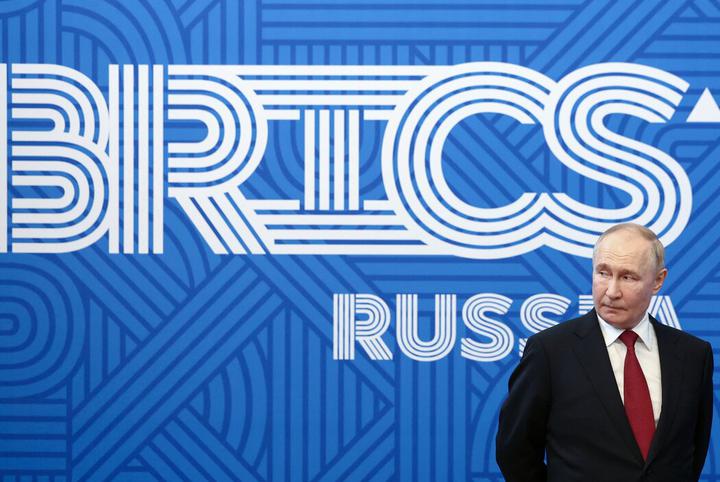The 16th BRICS Summit, held in Kazan, Russia, from October 22 to 24, has drawn global attention as it marks the first summit since the group's expansion.
Ian Bremmer, President of Eurasia Group, said that the fact that this summit was held in in Kazan in Russia says a lot about the state of the non-West. If you're not in the G7, you're still finding ways to work with the Russians, and that's not going to change anytime soon. But it is not an alternative to the G7. It's a large grouping, and they have different political, different economic systems. They want to work with everybody. So we're not heading towards a new Cold War, at least not in terms of the big global architecture.
Keith Johnson, reporter at Foreign Policy, wrote that though Western capitals dismiss the group as a grab bag of countries, “it is hard to appreciate just how much resentment there is of Western hypocrisy and hegemony, all mortar helping to bond the loose membership of BRICS.” The BRICS countries can be said to represent a desire for an alternate global order. It is probably not a coincidence that the summit is not only being held in Russia but is also taking place as two Bretton Woods institutions—the International Monetary Fund (IMF) and the World Bank—hold their fall meetings in Washington.
Gerald Easter, chair of the political science department at Boston College, stressed that the meeting represents an important step forward to the establishment of an alternative international trade/finance structure to what the West established many decades ago. It seems reasonable to assume that within 10 years--this structure will be viable and will co-exist with the western int'l economic institutions. As long as the relationship between the BRICS core members (especially China, Russia, India) remain committed to the project, then it will be welcome by more and more countries around the world, which for either economic or political reasons seek an alternative to dealing with Washington/Brussels.
Mihaela Papa, Director of Research and Principal Research Scientist MIT Center for International Studies, thought that “The BRICS summit marked a significant event both for the group’s internal evolution and for its relations with external actors. Internally, it was a test of the members' ability to collaborate on joint initiatives. Although the summit did not produce a major breakthrough on monetary cooperation, the members managed to agree on priorities such as reforming global governance and incorporating new partners, as well as practical initiatives like establishing a BRICS grain exchange. The group’s decision to pursue new initiatives on a voluntary basis allows progress in areas where certain members are more ambitious.”
Papa added: “Questions surrounding Ukraine and other major conflicts were addressed, signaling that BRICS cannot ignore these challenges and sees itself as having a role in de-escalation and peacebuilding. Major progress on resolving the India-China border conflict is significant for both BRICS and international relations more broadly."
Sushant Singh, a lecture in South Asian Studies Council at Yale University, said that 2024 BRICS is to bring the major non-western countries on the same platform in Russia sends a strong message to the West. That it became the place where PM Modi and President Xi could finally meet was equally significant. He thinks the role of BRICS at this moment is to create an alternative to the West-controlled structures of global governance that ignore the interests and the sentiments of the countries of the Global South. That is why so many countries have applied to be a member of the BRICS despite Western concerns. The economies of the BRICS countries are now bigger than the G7 group of countries and this will increase further in the future.
However, Singh argues that BRICS is still evolving as an institution. It has some distance to go before it starts playing a leading role for the Global South. That would mean taking positions which will bring it in confrontation with the developed western countries. Some of the BRICS members like India are not yet ready for such a situation as they want to be equally friendly with the West.
As the BRICS countries expand their "circle of friends", the influence of the International Monetary Fund and the World Bank is declining. “In recent years … the IMF has diverged from its obligation to support countries in need,” write Andrés Arauz and Ivana Vasic-Lalovic of the Center for Economic and Policy Research. Meanwhile, the World Bank has lulled itself into a complacent belief that what it was doing was working, Oxford University’s Paul Collier writes in “The World Bank Is Failing And Needs a Restart.” If current trends continue, “the global poverty count will soon revert to its grim pre-1990 upward March,” he argues, adding that the prospect of rising poverty “should be galvanizing the bank into action.”
(AISA PACIFIC DAILY)
